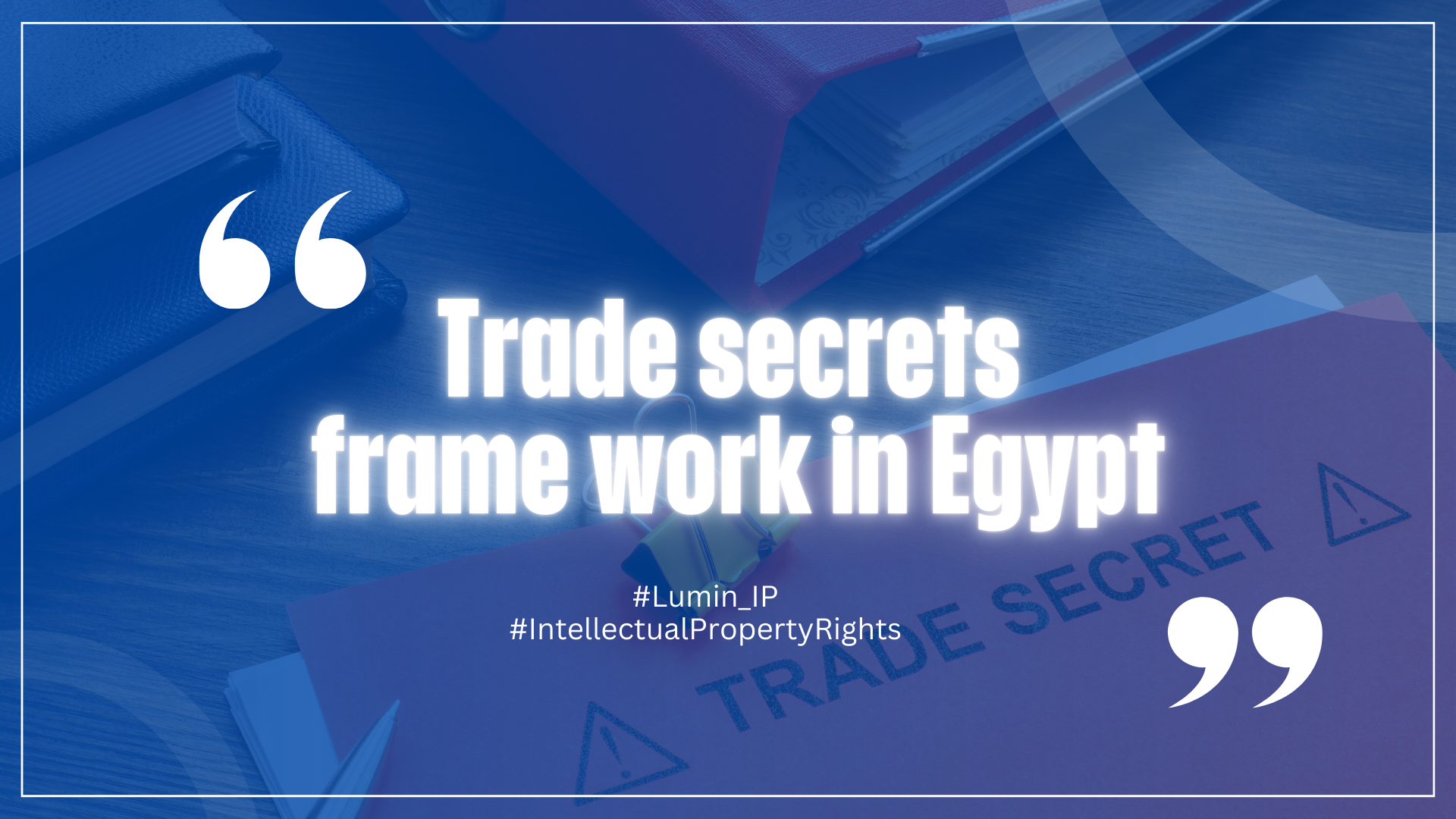
Trade secrets frame work in Egypt
Introduction
In our fast-paced world, protecting trade secrets is a vital component of intellectual property rights (IPR) that safeguard confidential business information, providing companies with a competitive edge and ensuring fair competition. This article explores the concept of trade secrets, the legal framework governing them in Egypt, enforcement, and legal remedies for breach of agreements.
Trade Secrets Definition
There is no unified definition for trade secrets. However, WIPO defines trade secrets as intellectual property rights on confidential information which may be sold or licensed. According to this definition, in order to qualify as a trade secret, the information must be commercially valuable because it is secret, known only to a limited group of people, and subject to reasonable steps taken by the rightful holder to keep it secret.
The European Union Intellectual Property Office (EUIPO) defines trade secrets, similarly, emphasizing that trade secrets encompass valuable confidential business information. This can include formulas, practices, processes, designs, instruments, patterns, or compilations of information. The unauthorized acquisition, use, or disclosure of such information is considered a breach of trade secret protection.
Legal Framework for Trade Secrets in Egypt
Trade secrets in Egypt are referred to as undisclosed information. The Egyptian legislature uses the term “undisclosed information” to describe trade secrets or confidential information. According to Egyptian Law No. 82 of 2002 on the Protection of Intellectual Property Rights, trade secrets are defined by the following criteria:
- Confidentiality: The information must not be generally known or easily accessible to individuals within the relevant industrial sector. For example, a company’s unique manufacturing process that is not known to competitors.
- Commercial Value: The information must have commercial value due to its confidentiality. For instance, a secret recipe that gives a food product its unique taste.
- Protective Measures: The information must be subject to effective measures by the lawful controller to maintain its confidentiality. This includes implementing security protocols and confidentiality agreements.
The Egyptian IPR law complies with international standards as outlined in the TRIPS Agreement, to which Egypt is a signatory. The TRIPS Agreement (Trade-Related Aspects of Intellectual Property Rights) requires member states, including Egypt, to protect trade secrets against unauthorized use or disclosure.
However, the person who is lawfully in control of undisclosed information must take all appropriate measures to preserve the confidentiality of such information and prevent its circulation among unauthorized persons.
Forms of Trade Secrets Protection in Egypt
In Egypt, trade secrets are to be protected through written agreements. The most common agreements in Egypt are Non-Disclosure Agreements and Non-Compete Clauses:
- Non-Disclosure Agreements (NDAs):
A non-disclosure agreement (NDA) is an agreement between two or more parties to protect secret or confidential information. A signed NDA helps the parties to the agreement to protect the confidential information from being shared with third parties. In addition, it helps business owners to protect their secrets.
Typical examples of NDAs include agreements between companies before merger or acquisition processes, technology transfer contracts, and agreements between businesses and employees or clients.
To be effective, NDAs should contain the following elements:
- Clear and Concise Information: The protected information should be clearly defined and concise.
- Limited Scope: The scope of the contract should be limited to authorized parties.
- Determined Duration: The duration of the contract should be specified.
- Remedies for Breaches: The agreement should outline the remedies for breaches in a separate clause.
- Non-Compete Clauses:
Non-compete clauses can be included in employment contracts to prevent former employees from joining a competitor or starting a new business in the same industry within a specified time frame and geographical area. These clauses are designed to protect the employer’s trade secrets and confidential information by restricting the employee’s ability to use such information in a competing business.
It is important to note that non-compete clauses must be reasonable in scope, duration, and geographical area to be enforceable. After the agreed-upon time frame has lapsed, the employee should be free from compliance with the non-compete clause.
Enforcement and Legal Remedies for breach of agreements
Merely stating undisclosed information in an agreement does not guarantee that the obliged party will not breach the terms. In such cases, Egyptian IPR Law No. 82 of 2002 provides avenues for legal remedies. Damaged parties in trade secrets agreements may seek relief through the Egyptian courts.
Injunctions:
Obtaining an injunction can immediately prevent the use or disclosure of trade secrets. This legal remedy is crucial for stopping ongoing breaches and mitigating further damage.
Damages:
Damaged parties may seek monetary compensation for any losses incurred due to the misuse and non-compliance with the agreement. In addition, the compensation could include actual damages, lost profits.
Conclusion
In summary, trade secrets are crucial for maintaining a competitive edge by protecting confidential business information. Egyptian Law No. 82 of 2002 provides robust legal protections for trade secrets, aligning with international standards.
It is essential to draft these agreements concisely to protect your future rights and prevent misconceptions. Therefore, having an expert draft these agreements is vital.
At Lumin IP, we specialize in creating tailored trade secret agreements, including NDAs and non-compete clauses, to ensure your business’s confidential information remains secure. So, don’t forget to contact us to safeguard your trade secrets and maintain your competitive advantage.
–Hazem ElKhatib, Aug.2024

Get in Touch
Let’s Protect Your Ideas
